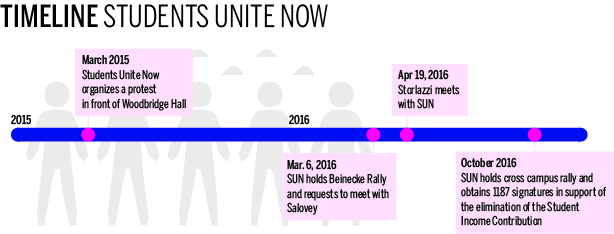
At a rally outside Woodbridge Hall last month, the activist group Students Unite Now demanded that University President Peter Salovey sit down with its representatives to discuss the elimination of the student effort, an amount that students receiving financial aid must contribute to Yale every year.
But in an interview with the News on Friday, Salovey said it would make more sense for SUN, which has held several similar rallies in the past two years, to meet with the officials in Yale College who directly administer the financial aid system. And he also voiced concerns about the tactics SUN has employed in the past, citing an episode last April when the group sent more than two dozen representatives to a meeting with Director of Financial Aid Caesar Storlazzi.
“It’s far more productive to have a meeting with a student or a small group of students,” Salovey said. “Being confronted by a crowd is not a meeting.”
At last month’s rally, supporters of SUN lined up one by one to submit letters to an administrator standing in the doorway of Woodbridge Hall. At the time, organizers told the News that one of the goals of the rally was to persuade Salovey to meet with SUN. On the group’s official Facebook page, SUN complained that the president had “refused to meet with students to listen to our experiences of financial aid at Yale.”
But on Friday, Salovey said the demonstration outside Woodbridge Hall “didn’t create the ideal context for a productive, constructive dialogue.”
“Demands are not a context for a conversation, especially a conversation where all parties involved have the same goal, which is to support our students,” he said.
SUN organizer Isadora Milanez ’18, however, said on behalf of the group that Salovey’s response to the request was unfair.
“For over a year, President Salovey has refused to meet and hear from students about our lived experiences,” Milanez said. “We would prefer that he spend his time working with low-income students to solve the problems we face, rather than musing about the format of our requests for a meeting.”
Salovey would be hard-pressed to speak individually with every student group that requests a meeting. But he holds office hours in Woodbridge Hall about twice a semester with six to eight students at a time, according to Joy McGrath, the president’s chief of staff. Pilar Montalvo, the director of administrative affairs, organizes those meetings.
Salovey also meets twice a year with the leadership of the Yale College Council, which has advocated for financial aid reform in the past, and he visits the residential college dining halls every other week to speak informally with undergraduates.
And in times of crisis, Salovey has shown a willingness to meet students for extended periods of time. As racially charged protests swept Yale’s campus in November 2015, Salovey held several tense, hourslong meetings with representatives of Next Yale, a coalition of students of color and their allies.
Founded in 2012, SUN advocates for the complete elimination of the summer and term-time student contribution to tuition — which totals $5,950 for most students — on the basis that the cost prevents undergraduates with time-consuming campus jobs from taking full advantage of the academic and extracurricular opportunities at Yale. SUN works closely with UNITE HERE, the umbrella organization that sponsors the blue- and pink-collar unions Local 34 and Local 35.
Salovey told the News that he is generally not involved in discussions about financial aid, although he occasionally weighs in on important decisions. For the most part, Storlazzi and Dean of Admissions Jeremiah Quinlan are responsible for shaping Yale’s financial aid policies, he said.
Over the years, SUN has met with several Yale College administrators who play a greater role in financial aid policy. Last April, the group sat down with Storlazzi to discuss its concerns about the student effort. And in early February, several members met with Secretary and Vice President for Student Life Kimberly Goff-Crews to share stories about how the student income contribution has personally affected their lives.
“We had a good discussion about the specifics of their concerns, particularly how they feel the current student income contribution requirements differ from the experience of earlier generations of Yale students,” Goff-Crews said.
Former University Secretary Sam Chauncey ’57 expressed sympathy for Salovey, noting that the president of Yale always receives more meeting requests than he can possibly satisfy.
“If every single person who had a question about Yale policy or procedure went immediately to the president, he wouldn’t have any time to do anything else,” Chauncey said.
Around 150 students attended the SUN rally outside Woodbridge Hall in March.







